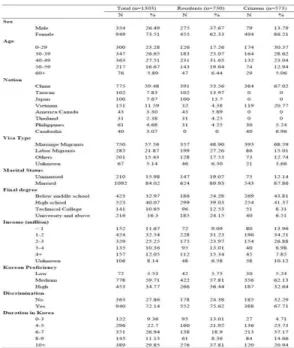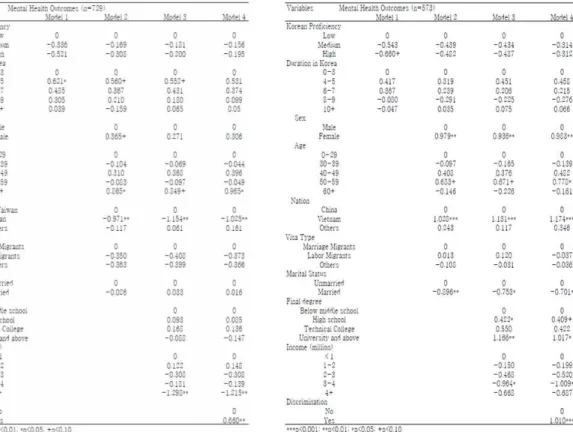1. Introduction In South Korea, Immigration is considered to be a relatively new phenomenon. Korea started experiencing
*Corresponding Author : 조영태(youngtae@snu.ac.kr)
Received August 8, 2017 Revised September 2, 2017 Accepted September 20, 2017 Published September 28, 2017
Acculturation and the Mental Health Status of the Immigrants in South Korea : Convergence to the General Tendency?
Min Jeong Kim
1, Chaelin Ra
2, Youngtae Cho
1*1
Dept. of Public Health Sciences, School of Public Health, Seoul National University
2
Department of Preventive Medicine, University of Southern California
이주민의 문화동화와 정신건강 : 일반적 경향으로의 융합인가?
김민정
1, 라채린
2, 조영태
1*1
서울대학교 보건대학원 보건학과
2
미국남가주대학교 예방의학과
Abstract This study was conducted to study the effect of acculturation on the permanent resident and naturalized citizens’ mental health status. The Survey Data of Foreign Residents in Korea 2012 was utilized.
Independent variable was the acculturation level, measured by the duration of life spent in Korea and the level of Korean proficiency. The dependent variable was the mental health outcome. Initially, acculturation showed protective effect on mental health of immigrants. But after adjustment of control variables, the effect of acculturation disappeared. This result does not converge into the general trajectory of mental health status among immigrants regarding the level of acculturation. The experience of discrimination had outstanding negative effect, which suggests policy inception point.
• Key Words : Acculturation, Naturalized Migrants, Permanent Residents, Mental Health, Experience of Discrimination
요 약 이 연구는 우리나라에서 영주권을 얻었거나 귀화한 외국인들의 정신건강과 한국문화 동화 간의 관계를
고찰하였다. 영주권자 및 귀화자의 건강을 포함한 가장 최근 자료인 2012년 거주외국인 조사자료가 분석에 활용되 었다. 분석에 사용된 주요변수는 한국거주기간과 한국어 수준으로 측정된 문화동화 수준과 정신건강이었다. 문화동 화수준이 영주권자와 귀화자의 정신건강을 보호하는 것처럼 보였지만 통제변수들이 분석에 추가된 후 그 효과는 사라졌다. 이러한 경향은 다른 나라에서 발견된 문화동화와 정신건강 간의 일반적 결과에 융합하지 않는 결과이다.
한편 차별경험이 이주민 건강에 매우 중요한 변수임이 발견되었다.
• 주제어 : 문화동화, 귀화자, 영주권자, 정신건강, 차별경험
growing population of immigrants from the late 1980s.
Korea opened its borders to foreign workers in 1990, admitting more migrant workers. Moreover, marriage migrants increased in Korea, as the international marriage between Korean men and foreign wives became popular from the 1990s[1]. As of 2014, It is estimated that there were about 1.6 million foreign residents in Korea. This is about 3.5% of the total population. Permanent residents have reached 60,000 in 2011, which is a substantial increase from 6,000 in 2002.
Compared to the total number of 49 naturalized citizens in 1991, the naturalized citizens of Korea have reached over 100,000, 213,197 in 2016[2].
It’s crucial that the health status of the permanent residents and the naturalized citizens of Korea improve or at least not deteriorate as they acculturate to Korean society, assuming that they are going to stay long term in Korea. However, the existing studies only focus on particular types of immigrants. It is rare to find studies of the immigrants done at the national level. All the more, studies on the acculturation are even harder to find. As previous surveys for immigrants in Korea have been performed by various government agencies or research centers in order to address short-term needs and goals, they are considered to be unsystematic and inconsistent[3].
Most studies of the immigrants’ acculturation and health are carried out traditional destination countries such as the United States, Canada, and European countries[4]. Many people expect that the immigrants’
health status would get better as they get more acculturated, but the result turned out to be the opposite. The study’s result showed that the health advantage of the immigrants erode over time[5].
The studies of the association between acculturation and health among the Hispanics living in the United States reveal that the health advantages of the immigrants decrease as the duration in the United States increase[6]. In studies led by Abraido-Lanza, the rates of risky health behaviors including smoking, alcohol use and high body mass index of Latinos
seemed to increase with higher acculturation. This suggest that Latinos get exposed to different risk factors or they pick up unhealthy behaviors in the acculturation process[7]. Studies also showed that the more acculturated immigrants were more likely to have poor health in Canada[8].
The mental health is also found to have the same trend. Studies of Mexican Americans living in Los Angeles showed higher acculturation associated with higher lifetime rates of psychiatric disorders including phobia, alcohol abuse or dependence, and drug abuse or dependence[9]. Higher acculturation was also associated with increased psychological distress among Hispanic American young adults[10]. In Europe, some studies found that immigrants’ dissatisfaction does not improve with increased duration[11].
Discrimination theory is one of the explanation behind the association of acculturation and poor mental health. Perceived discrimination is a chronic stressor contributing to poor mental health among immigrants[4]. Positive association between perceived discrimination and poor mental health, especially depression, was found in many studies[12]. The explanation of the discrimination theory is that as the stay in the destination country increases, the immigrants’ language proficiency improves, which results in their increased realization of the discrimination that they didn’t notice before. Thus the acculturation results in the increased exposure of the immigrants to the perceived discrimination. For instance, the studies of Mexican immigrant women in the U.S revealed that the second generation, rather than the first generation, experienced more discrimination [13]. The discrimination theory also explains why the second generation Korean American’s health is often worse than the first generation immigrants’ health[4].
Study results from the traditional destination
countries showed that although it is common to believe
that higher language proficiency helps immigrants
adapt to the new environment which results in good
mental health, the reality is that as the language
proficiency increases, the immigrants start to recognize the discrimination they face and their health deteriorates[14]. The Survey data of Foreign Residents in Korea 2012 controlled the discrimination variable, which allowed the to check the net effect of the language proficiency for this study.
The hypotheses for this study are: (1) The mental health of the permanent residents will improve as the duration in Korea increases; (2) The mental health of the permanent residents will improve as their language level increases; (3) The mental health of the naturalized citizens will improve as the duration in Korea increases; and (4) the mental health of the naturalized citizens will improve as their language level increases.
2. Method
With the Survey data of Foreign Residents in Korea 2012, conducted by IOM Migration Research &
Training Centre of Korea (IOM MRTC), our research team conducted a secondary analysis of cross-sectional data. The Ministry of Justice provided the immigrant population list that IOM MRTC used to draw the sample through stratified random sampling. The sample size of n=1303 was used in total, with n=730 being permanent residents and n=573 being naturalized citizens.
Our independent variable was the level of acculturation. For the measurement of the level of acculturation, proxy measure of the duration of life spent in Korea was used. The proxy measure was categorized into five groups (less than 4 years, 4-5 years, 6-7 years, 8-9 years, and greater than 10 years).
The question ‘What is your level of the linguistic competence for speaking Korean?’ was asked, with answers 5 as ‘excellent’, 4 as ‘good’, 3 as ‘so so’, 2 as
‘not so good’, and 1 as ‘poor’. High level is composed of the scores of 4 or higher, medium level is composed of 3, and low level is composed of 2. The general mental health status, which is the dependent variable, was assessed by the modified version of the Hopkins
Symptom Checklist (HSCL).
SAS 9.4 was used to conduct multiple logistic regression in order to investigate the probabilities of having poor mental health adjusted for sex, age, nation, type of visa, education level, income level, marital status, Korean proficiency and discrimination experience. This model calibrated for each variables.
3. Result
Table 1 presents the socio-demographic characteristics of permanent residents and naturalized citizens. Overall, the female proportion (73.51%) is greater than the male proportion (26.49%). The proportion of female is greater in the citizens group (86.21%) than that in residents group(62.33%). Most residents are from China (53.56%) followed by Taiwan (13.97%), and Japan (13.7%). Most citizens are from China (67.02%), followed by Vietnam(20.77%). For the visa type, the marriage migrant group, followed by the labor migrant group is the largest.
<Table 1> Socio-demographic Characteristics of Sample
The proportion of married migrants in the citizens group (87.86%) is slightly higher.

